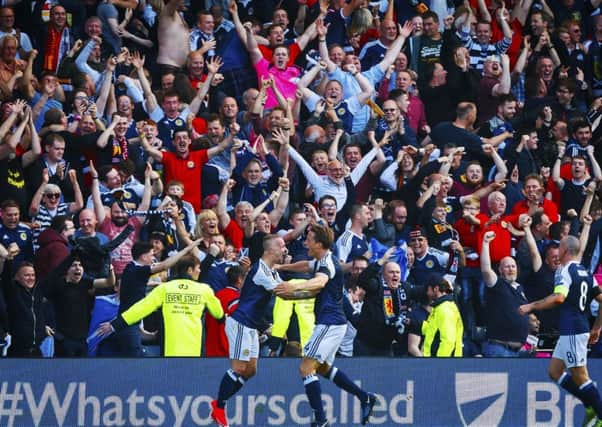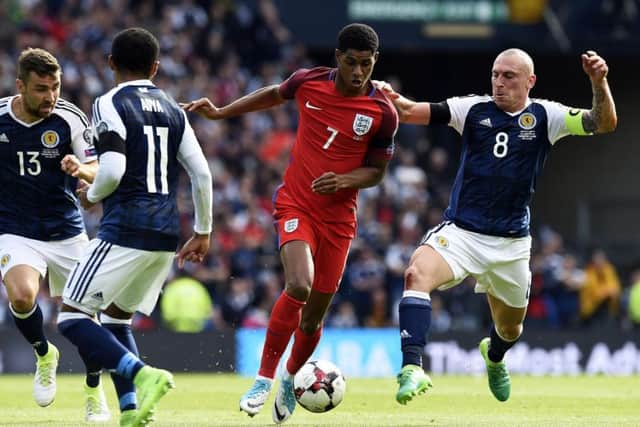Five things we learned about Scotland 2 - 2 England


No glorious failure, only mistakes
Hampden Park was ready to leave its foundations, leave Mount Florida and be sent into orbit, such was the jubilation, the joy, the lose-your-mind-and-embrace-the-people-around-you-as-if-they-are-family-you’ve-not-seen-after-years-in-captivity. Scotland had turned around a goal deficit to lead England going into stoppage time.
The first win over the ‘Auld Enemy’ was tantalisingly close. The first win since Don Hutchison scored the only goal at Wembley in a 1-0 win in 1999 - a result which still left disappointment as Scotland missed out on Euro 2000 - the first at Hampden since 1985. The Rous Cup anyone?
Advertisement
Hide AdAdvertisement
Hide Ad

But then mistakes were made. Not one, not two, not three, but at least four.
Mistake #1 England had a free-kick in a dangerous area which Eric Dier fired at goal. Craig Gordon - much more to come from him - parried the ball poorly, not for the first time. He perhaps could have held the shot but beat it away back into the middle of the box rather than away from goal. Yet, Scotland won possession...
Mistake #2 Stuart Armstrong drove forward, prompting a counter-attacking opportunity, three v one in Scotland’s favour. But instead of shifting the ball left he went right and England won the ball back. It was moved left and Raheem Sterling crossed...
Mistake #3 Harry Kane snuck in between Charlie Mulgrew and Andrew Robertson in acres of space a few yards from the goal-line in the six-yard box...


Mistake #4 It was a floated cross from Sterling which was in the air long enough for someone of Gordon’s size to claim the ball and take the pressure off.
It neatly summed up Gordon’s afternoon, he looked unsteady throughout. Constantly beating the ball away in an unorthodox manner.
He was at fault for the opening goal when Alex Oxlade-Chamberlain cut inside and fired straight at him but, somehow, he twisted his body and allowed the ball to hit the back of the net.
The build-up to the goal doesn’t show him in good light either, taking his eye off a poor back pass before having to scramble to knock the ball out for a throw-in, which the goal came from.
Advertisement
Hide AdAdvertisement
Hide AdDefensive mistakes are the reason Scotland don’t make tournaments, nothing to do with glorious failure.
The new system
After the whistle sounded on a ripsnorter of a finale, Gordon Strachan spoke to the media about the pride he felt. He also explained the reasoning for the change to a back three, wanting to curtail the attacking width provided by the English full-backs. Something which he has had in mind since playing Germany last year.
This effectively gave Scotland four central players in midfield, two very quick wing-backs, three centre-backs and Griffiths alone in attack.
The opening ten minutes were superb by Scotland as they pressed aggressively in midfield, pushing high up the pitch and preventing England from building from the back, through the middle. Then it stopped.
Scotland withdrew, getting deeper and deeper. By the end of the first half fans were bemoaning the negativity. The game as a whole was bordering on soporific - understandable considering two West Brom players were in the midfield - but if Scotland carried on the way they ended the half the inevitable would happen and they’d concede or they would cause a raucous crowd to drift off into a state of paralysis.
Gradually, after the interval, Scotland showed ambition. An ambition which they started with before wilting against perceived better opposition.
Armstrong was trying to drag the team forward towards Griffiths who must have felt like he was back playing with Hibs, having to do it all himself. But he eventually got support, even more so with the arrival of Chris Martin who provided a greater focal point.
Strachan said that was the plan, to change the dynamic midway through the second half if they were losing or drawing. Both substitutes, Martin and Fraser, who had replaced Robert Snodgrass - yes, he was on the pitch - had a hand in the goals, winning free-kicks.
Advertisement
Hide AdAdvertisement
Hide AdStrachan just about got it right over the piece but there is still the feeling that is overly negative. If he started with Martin and Griffiths in the system would Scotland have posed a more consistent threat? Probably.
Super Leigh Griffiths
If there was any doubt about Griffiths’ ability to lead the line for Scotland before Saturday’s afternoon’s clash, 90 minutes later, they have all but been extinguished. He was phenomenal.
He’s never had the full trust of Gordon Strachan and there is the inkling that it is the same with Brendan Rodgers, but he put in a mature, measured display, up against two powerful, Premier League defenders. In short he was an absolute pest and it was wonderful viewing.
From the first seconds he was closing down Gary Cahill as if to say ‘I’m here pal, I’m here all day’. And he was. He backed in to win fouls, he held the ball up, he ran the channels intelligently, he linked play competently.
His smart running, spinning in behind the centre-backs saw him create the best chance of the game for Scotland only for Andrew Robertson to fire over.
His touch was perfect. Taking the ball in, caressing the ball to team-mates. It had to be as he was isolated for large parts. Even so, when he had to chase lost causes his head didn’t go down, there was no moaning, just a constant work ethic.
He deserved his goals, his first for Scotland on his 13th cap. Two splendid free-kicks. He manipulated the wall to his advantage, aided by Joe Hart leaving large spaces. Even still they were pinpoint.
The goals, his performance in general deserved to win the game. Even with the draw those two swooshes of the left boot and the scenes which followed will live long in the memory. So should Griffiths’ all-round performance.
Scott Brown v Paul Scholes
Advertisement
Hide AdAdvertisement
Hide AdThe Scotland captain had been subject of much debate in the run up to the qualifier. Manchester United legend Paul Scholes claimed the Celtic skipper would not have the same impact for a top Premier League club as he has had for Celtic, while former England skipper Terry Butcher insisted the 31-year-old could play for a top-four club down south.
The Scotsman earmarked the clash between Brown and Dele Alli as a key match-up to deciding the game, a potential powder keg. Instead, all they did was cancel each other out, neither having the effect and influence they or their teams would have liked.
Brown did have to play with one arm tied behind his back after a foolish early ‘leveller’ on Alli in the third minute, picking up a yellow card. Something he is not used to when playing in the Ladbrokes Premiership, afforded extra leeway.
He allowed Alex Oxlade-Chamberlain to wriggle free for the opening goal. He made the challenge but the Arsenal midfielder reacted quicker to the loose ball. In an attacking sense he was nonexistent, his most memorable, for want of a better word, offering in possession was in the first half, a long pass that bounced out of play. The nearest player was roughly a New York city block away.
He still worked tirelessly as he always does, patrolling the space in front of the back three vigilantly without being the force he is in Scotland.
It wasn’t the performance he’d have been looking for to prove Scholes wrong.
Where does it leave Scotland?
Slovakia and Slovenia, as expected, both won which leaves Scotland trailing in fourth place by four and three points respectively. With four fixtures remaining Scotland are required to win 12 points. Not just to secure second but make sure they are not the worst of the second-placed teams.
The last two fixtures at Hampden suggests it is do-able. However, two of the games are away from home, games which Scotland are prone to slipping up in.
Advertisement
Hide AdAdvertisement
Hide AdThe Malta and Slovakia fixtures will take care of themselves at Mount Florida, Scotland will attack and be backed by a supportive crowd who are slowly being won back onside. Even more so if Scotland come into the encounters having defeated Lithuania.
It will be intriguing to see how Strachan approaches the game in Vilnius. It really is must-win time but will his selection reflect that. With strong performances from Christophe Berra and Charlie Mulgrew he’ll likely feel comfortable going with a back four, bringing in an extra forward to supplement the attack.
Lithuania is the defining fixture; win and momentum suddenly builds. The two home fixtures would allow for that to increase at pace, leading to that meeting in Slovenia. A lot of football is still to be played, but what’s football without thinking ‘what if’?